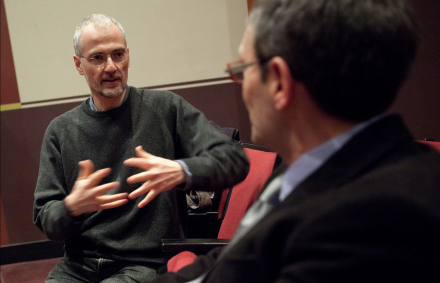Faculty
Composition by Augusta Read Thomas Garners National Media Attention
Resounding Earth, a new composition by Augusta Read Thomas incorporating the sounds of 300 different pieces of metal being struck, has received praise from local and national media following several performances and a DVD release. Thomas spent a year developing the piece with Third Coast Percussion, a Chicago-based percussion quartet and Ensemble-in-Residence at the University of Notre Dame’s DeBartolo Performing Arts Center.
“It was to take something that was true to my music and push it all the way," Thomas, University Professor of Composition in the Department of Music, told the Wall Street Journal about her inspiration to use 125 bells and more than 150 other metal objects within the piece.
The Chicago Tribune’s review highlights how the melding of bell and metal tones “…sounds at once ancient and modern — bright, dark, shimmering, shattering, rhythmic, lyric;” and Chicago Classical Review praises how “Thomas neatly matched each rhythmic gesture to an appropriate sound and dynamic.”
Third Coast Percussion will continue to perform Resounding Earth in 2014 across the country. A preview of the DVD, including short segments from a performance of the composition, is available on YouTube. Additional information—including Thomas’ program notes—is available at her website.




